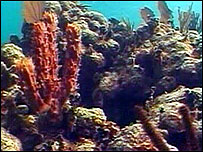|
By Roger Harrabin
BBC News, Belize
|


Healthy coral is crucial for Belize's tourist industry
|
Five metres (15ft) below the clear green water of the western Caribbean lie the fractured remains of a coral dome hundreds of years old. Local scientists say it's now so badly damaged that another hurricane would simply sweep it away.
But they don't primarily blame hurricanes for the damage to the coral here on the Belize Barrier Reef; they blame climate change.
And they are backing a petition pressing the United Nations World Heritage Sites Committee to acknowledge that climate change is already damaging world heritage sites.
The five sites are the Belize Barrier reef, at 321km (200 miles) long, the biggest in the western hemisphere; the Australian barrier reef; and glacier parks in Nepal, Peru and the Rockies where glaciers are disappearing as the climate warms.
The World Heritage Sites Treaty stipulates that listed sites should not be damaged by signatories to the treaty, but it was mainly designed to protect the world's treasures in the event of wars.
The stakes are high because if the UN accepts the case, it might lead to poor countries attempting to sue rich countries for damages for the greenhouse gases they've emitted.
Sensitive ecosystem
Scientists in Belize believe their case is strong. They say the 297km (185 mile) reef here has suffered more than 40% damage since 1998.
They particularly implicate three events of coral bleaching when water temperatures were high.
Corals get their colour from tiny single-cell plants - zooxanthellae - which provide for the reef-building creatures, the polyps.
When temperatures are very high for a protracted period, the zooxanthellae are driven away, the coral loses its colour, the polyps lose their food and so the reef is weakened.
The reefs then easily fall victim to the many forces that assail them - over-fishing, pollution, creatures that eat them, tourist snorkellers who inadvertently smother them with sand, and particularly the storm waves of hurricanes.
Local fishermen say there is no record of bleaching before 1998.
Drastic decline
Billy Leslie, who runs the Hustler Dive School in San Pedro in northern Belize, said: "My father was a commercial fisherman. He tells me that we have never heard of coral bleaching like this. It's a horrible sight to see; the coral just gets whiter and whiter every day."
Richard Foster, a wildlife cameraman, said: "I first started diving here in the early 80s and you just won't believe the difference with today. The corals were so thick they were competing with each other on the bottom. There was no space between the corals.

Billy Leslie has seen coral deteriorate drastically since the 80s
|
"Now you've got these open spaces with grey, dying coral and the occasional live one in between. It's very sad to see." Dr Melanie McField, from the Smithsonian Institution in Washington DC, US, has been studying the reefs for more than a decade.
She is confident that climate change is a key factor: "On an annual basis, the sea temperatures in the Caribbean haven't changed much, but we are now registering prolonged periods of severe heating that we didn't see before.
"When the water temperature is elevated we get a bleaching alert - and this coincides pretty accurately with the bleaching events.
"The other big sign that the water temperatures are to blame rather than local pollution is that the bleaching episodes happen all over the Caribbean at the same time."
Dr McField is angry that Belize has been working hard to protect its reefs but is suffering from a problem beyond its control.

The bleaching process is clearly visible in affected coral
|
This, she says, is an example of a small country with low greenhouse gas emissions bearing the brunt of damage it didn't cause. She is also concerned about another major fear for the future of the corals - ocean acidification.
The Royal Society, the UK's academy of science, argued last year that so much CO2 from fossil-fuel burning was being absorbed into the oceans that surface waters were becoming acidified.
Research in Plymouth and Jerusalem shows that many species of corals are easily damaged by even a slight lowering of pH.
Contested claims
A small minority of coral researchers believe that fears over climate change and acidification have been exaggerated.
They argue that over time the reefs will adapt to warmer waters and that calcium littering the ocean floors will buffer the effects of acidification.
Dr McField accepts that reefs might eventually adapt but says this could take thousands of years.
In the meantime countries making money from reefs would suffer huge economic damage, she says.

Belize's coral reef is the second biggest in the world
|
In Belize, the reef is a major tourist earner - nearly half the country's 260,000 visitors come to see it. The reef is also the mainstay of the economically vital fishing industry. Miguel Alamilla, who runs a marine protected area off the town of San Pedro, has a message for the big nations emitting greenhouse gases.
"They need to open up and don't be egoistic but think globally," he said. "Be aware that people are dependent on the coral reef and their livelihoods depend on that.
"If it is destroyed what will happen to them?"
The UN campaigners believe these are powerful arguments in their favour.
They will face, though, determined resistance on the World Heritage Committee from the US. Objections to the petition include:
- There is no conclusive proof that that the reef are being damaged by greenhouse gas emissions
- Any damage to the reef is accidental, so it does not breach the World Heritage Sites Treaty.
- Accepting the petition on a controversial issue such as climate change would spoil the harmonious relations of the World Heritage Committee.
The petition will be heard when the committee meets between 8 and 16 July. 

~RS~q~RS~~RS~z~RS~24~RS~)